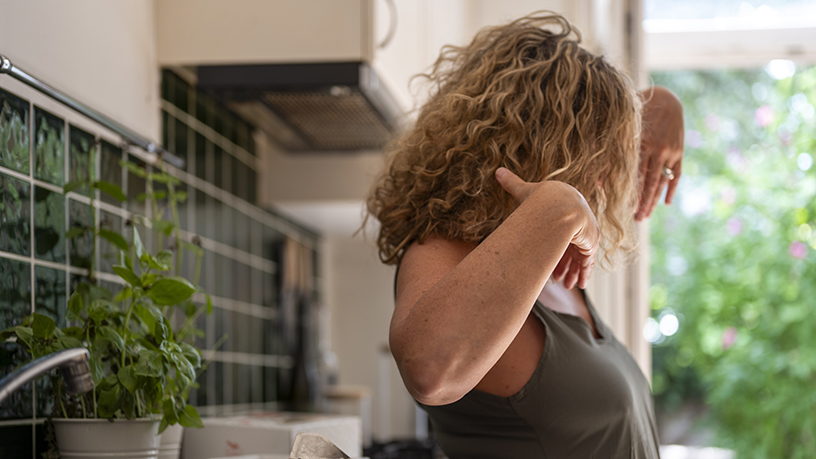On this page
Key takeaways
- Maintaining a healthy weight, staying physically active and eating a balanced diet can reduce risk factors for some chronic health issues.
- Higher levels of mental activity are associated with better brain function and reduced risk of dementia.
- You can support and manage your health with some simple checks and lifestyle choices.
Australian women are living longer than ever, with females born in the 2020s now expected to live to 85 years of age.1
That’s something to celebrate, but it also highlights the importance of staying on top of your health.
According to the Australian Burden of Disease Study, around 35% of ill health and premature death in women could potentially be prevented by avoiding 20 key risk factors.2
These range from behaviours like smoking and unsafe sex to dietary and metabolic risks like eating too much salt or having high blood pressure.
The good news? Knowing what health issues are most likely to affect women and how to reduce your risk, can help you take control of your long-term health and wellbeing.
We share some of the most common health concerns for women, and some simple, practical tips to help you stay well.
Bladder health
Urinary incontinence is common in women. Although it can affect you at any life stage, it most often occurs after pregnancy and menopause.
Whatever your age, daily habits can help prevent leakage or loss of bladder control.
- Don’t go to the toilet ‘just in case’. Overriding your body's natural signals can lead to issues with your bladder over time.
- Always sit down on the toilet. Your bladder empties better when you are seated and relaxed, not ‘hovering’.
- Constipation is a common cause of urinary incontinence in younger women. Stay hydrated and eat a diet high in fibre and whole foods.
- If bladder leakage is an issue, try switching to decaffeinated drinks as caffeine can irritate the bladder.
- Practice pelvic floor exercises. If you’re not sure how to do these, they can be taught by a specialised physiotherapist. Ask your GP for a referral or recommendation.
Bone health
Osteoporosis is when you have weak, brittle bones that are prone to breaks. When your bones are healthy and dense, they only tend to break with severe injury.
If you have osteoporosis, you can break or fracture a bone doing something as simple as carrying a heavy load or even sneezing. You might not know you have it until you experience your first fracture.
Women are at a greater risk of developing osteoporosis because bones lose calcium and other minerals at a much faster rate when oestrogen levels decrease during and after menopause.
If you are over 45, or you have specific concerns about your bone health, you can ask your doctor to assess your risk factors for osteoporosis.
Breast health
Breast cancer is the most common cancer in women in Australia and the second most common cancer to cause death in women after lung cancer.3
Knowing what looks and feels normal for you throughout the month can help you notice when something changes, so commit to monthly self-check breast exams. See your GP if you notice any unusual changes in shape, size or feel, or if you experience new or persistent pain.
Breast Screen Australia offers free breast screening (mammograms) every 2 years to women aged 50-74 via the Breast Screen Australia program. Women aged 40-49 and 75 years and older are also eligible, but you might not receive an automatic invitation.
Cervical cancer
Cervical cancer is mostly caused by the human papilloma virus (HPV) and is largely preventable through the cervical screening test. which replaced the pap test/smear, and HPV vaccination.
The HPV vaccine, typically administered via school-based programs, is an effective tool in preventing cervical cancer because it protects against HPV types responsible for most (not all) cervical cancers and genital warts. However, it does not replace the need for a cervical screening test because the vaccine does not protect you against all cancer-causing types of the virus. Women aged 25-74 should have the cervical screening test every 5 years.
It is possible to develop cervical cancer if you are not sexually active, although it's less common. Talk to your GP about having a regular cervical screening test.
Other types of cancers affecting female reproductive organs include cancers of the ovaries, vagina, uterus and vulva.
Speak to your doctor if you notice any symptoms including:
- abnormal or persistent vaginal bleeding
- unusual vaginal discharge
- swelling of the abdomen
- vaginal itching, burning or soreness
- pain, pressure or discomfort in the abdomen
- pain during sex
- changes in bowel or bladder habits
- vaginal lumps, sores or wart-like growths
Dementia
Dementia, including Alzheimer’s disease, is now the leading cause of death for Australian women.1 While there is no known cure for dementia, there may be ways you can reduce your risk.2
Being brain healthy involves looking after your brain, your body and your heart, according to Dementia Australia, which recommends the following:4
Look after your heart. The risk of developing dementia increases with conditions that affect the heart or blood vessels. Treating high blood pressure and cholesterol, not smoking, exercising regularly and eating a healthy diet will reduce your risk of both heart disease and dementia.
Stay active. Exercise is good for your brain. It increases blood flow, stimulating the growth of brain cells and the connections between them.
Challenge your brain. Higher levels of mental activity are associated with better brain function and reduced risk of dementia. Learning a new language or taking up a hobby, sport or musical instrument all stimulate the brain.
Heart disease
Coronary heart disease is the second leading cause of death in Australian women.5 Nearly 3 times more women die from heart disease than breast cancer.6
People with coronary heart disease have thickened, hardened artery walls due to a build-up of cholesterol and other substances that form plaque in a process called atherosclerosis. If the blood vessels get too clogged, the blood supply to the heart muscle is reduced, leading to chest pain (angina) and heart attacks.
Although heart disease is linked to age and hereditary influences, there are some risk factors within your control. These include things like managing high blood pressure and high cholesterol, stopping smoking and upping your physical activity.
Talk to your GP about more ways to stay heart healthy.
Menopause and perimenopause
Menopause is the name given to your final menstrual period, and marks the end of ovulation (when an egg is released from the ovary). Most women in Australia reach menopause between 45 and 55 years of age.
Perimenopause is the stage before menopause. It usually occurs in a woman’s 40s and is often the time when symptoms begin.
The change in hormone levels during perimenopause and menopause can trigger symptoms that include:
- hot flushes or night sweats
- changes in mood
- vaginal changes such as dryness and loss of tone
- sleep disturbance
- brain fog
Healthy living habits, menopause hormone therapy (MHT) and some complementary medicines may help reduce symptoms. Talk to your doctor about which treatments are most appropriate for you.
Sexual health
Most sexually transmitted infections (STIs) are bacterial or viral infections passed from one person to another.
While some people may not have any symptoms at all, common signs typically include:
- an unusual discharge from your genitals or anus
- bleeding after sex or between periods
- sores, blisters, warts or rashes near your genitals or anus
- pain on passing urine or during sex.
If you think you're at risk of STIs, always use safer sex methods such as condoms, and consider getting a check-up at a sexual health clinic every few months.
If you think you may have an STI, seek treatment as soon as possible. Left untreated, some STIs can lead to more serious health problems, including infertility.

Self-care starts with a checkup
Resources

At Bupa, trust is everything
Our health and wellbeing information is regularly reviewed and maintained by a team of healthcare experts, to ensure its relevancy and accuracy. Everyone's health journey is unique and health outcomes vary from person to person.
This content is not a replacement for personalised and specific medical, healthcare, or other professional advice. If you have concerns about your health, see your doctor or other health professional.
1AIHW. (2023). The health of Australia’s females.
2AIHW. (2024). Australian Burden of Disease Study 2024.
3Australian Breast Cancer Research. (2025). Awareness and statistics.
4Dementia Australia. (2024). Reduce your risk of dementia.
5AIHW. (2024). Deaths in Australia. Australian Government.
6Victor Change Cardiac Research Institute. (2025). Heart disease in women.
You might also like
Menopause: What it is and how to manage symptoms
What you need to know about menopause and how to manage the menopause journey.
Young at heart: Can you lower your heart age?
Most Australians have preventable risk factors for heart disease, which contribute to their ‘heart age’. Find out what they are and what you can do.
The lowdown on menopausal hormone therapy (MHT)
A closer look at menopausal hormone therapy and how it can help on your menopause journey.




